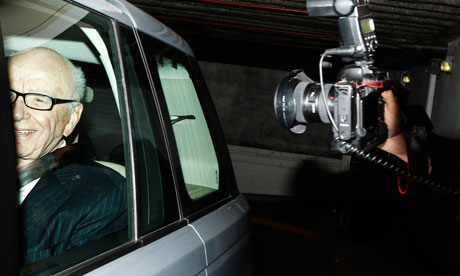Rupert Murdoch has capitulated to parliament and abandoned News Corporation's £8bn bid for BSkyB, as he faced the prospect of appearing in front of a judicial public inquiry to salvage his personal reputation and the right for his company to continue to broadcast in the UK.
After 10 days of sustained public outcry over phone hacking, and facing the prospect of a unanimous call by MPs to withdraw his bid for total ownership of the broadcaster, Murdoch succumbed at a morning board meeting in Wapping.
Company insiders indicated Murdoch was not making a tactical retreat and that a future bid for total control of BSkyB was now unlikely. The media giant said it was likely to "deploy our capital elsewhere" to avoid any more damaging battles in the UK. The News Corp deputy chairman, Chase Carey, said the bid had become "too difficult to progress in this climate".
The withdrawal represents the biggest single reverse of Murdoch's mercurial career, but may presage even further commercial damage not just in the UK, but worldwide. News Corp's current 39% stake in BSkyB could also still be at risk from the "fit and proper" test for ownership being conducted by regulator Ofcom.
On a cathartic day at Westminster in which politicians acted as if they had been liberated from the thrall of the Murdoch empire, David Cameron announced a sweeping public inquiry into widespread lawbreaking by the press, alleged corruption by police, and the failure of the initial police investigation into phone hacking. The prime minister said: "What has happened here is a massive firestorm of allegations that have got worse and worse."
The inquiry will also look at a new system of independent regulation of the press, the inadequacies of the previous Labour government to investigate newspaper malpractice, and the potentially critical issue of future cross-ownership between press and television stations.
There is certain to be renewed pressure to reduce the number of foreign owners of the British media, as well as a big Liberal Democrat push to impose stricter rules to prevent market domination.
The public inquiry will be led by Lord Justice Leveson, and will have the power to summon witnesses, including proprietors, Cameron, past prime ministers and senior newspaper executives, even if some of them are in jail.
In the first instance the judge, advised by a panel of experts, will look at future regulation before turning to specific allegations of corruption or lawbreaking.
Cameron, regaining some of the political initiative after 10 days on the back foot, made it clear he expected Rupert Murdoch to give evidence, saying: "If you own the media in this country, you should be able to be called under oath."
The prime minister also vowed that he was willing to see those found guilty in any future court cases stripped of the right to run a media company. He said: "The people responsible – whether they are directly responsible for the wrongdoing, whether they sanctioned it or whether they covered it up, and however high or low they go – must not only be brought to justice; they must have no future role in running a media company in our country."
Cameron also announced that he will be rewriting the ministerial code so that ministers, permanent secretaries and special advisers will be required quarterly to record meetings with senior media executives, including social meetings.
Cameron admitted the relationship between media executives and the politicians had become unhealthy. He said: "It was too close. Too much time was spent courting the media and not enough time confronting the problems."
He also revealed a new anger towards his former No 10 communications director, Andy Coulson, the former News of the World editor who has always insisted he knew nothing of phone hacking during his editorship of the paper.
As Ed Miliband described his appointment as a catastrophic misjudgment, Cameron said: "If it turns out he lied, it won't just be that he shouldn't have been in government, it will be that he should be prosecuted." The Guardian has published fresh details of warnings the paper's executives had given to Cameron's chief of staff, Ed Llewellyn, over Coulson. Downing Street said Llewellyn could not recall an additional warning in October 2010.
In an extraordinary speech during the truncated Commons debate on BSkyB, a passionate and sometimes raw Gordon Brown defended himself from the charge that he had been complicit in acceding to the regulatory demands of News International during his premiership.
He rounded on the cabinet secretary, Sir Gus O'Donnell, for opposing his plan to set up a judicial inquiry into phone hacking when he was in office. Quoting the confidential advice, he said O'Donnell admitted "there was a media culture permissive of unlawful activities and deliberate obfuscation by News International" but that "targeting the News of the World would have been deemed to be politically motivated because it was too close to the general election".
Brown branded News International "a criminal media nexus" which "claimed to be on the side of the law-abiding citizen" but in fact stood "side by side with criminals against our citizens". He added: "Others have said that in the behaviour towards those without a voice of their own, News International descended from the gutter to the sewer. The tragedy is that they let the rats out of the sewer."
O'Donnell is understood to be seeking an urgent consultation with Brown to release the full memorandum. Some Labour sources said Brown lacked political support within his cabinet to set up the inquiry so close to a general election. Faced by its rout on Wednesday, News Corp and the Murdoch family now face a battle to ensure that Rupert's son James, who was in charge of the British newspapers, can remain as BSkyB chairman in the face of City unrest. "James Murdoch's position is a concern," one investor said.
Pension funds were being urged to call for him to go. Alan MacDougall, managing director of PIRC, which advises pension funds and councils, said: "In light of current events it is time for the board to review whether BSkyB and its shareholders would benefit from a new, independent chair. And if shareholders agree it is time for reform, they should say so."
Murdoch's move capped a disastrous 10 days for a company that had been poised to win approval for the BSkyB takeover until the Guardian revealed that the News of the World had targeted the mobile phone of Milly Dowler, listening to and deleting messages left for her and giving her family false hope that she was alive when she had in fact been murdered [see footnote]. That triggered widespread public revulsion and adverse media coverage, forcing Murdoch to close the News of the World.
Mark Lewis, the lawyer who represents the Dowler family, and also brought the first phone-hacking cases, said: "This shows the power of the public to stand up to something – however big an organisation is, however far-reaching, however worldwide – and say 'No, something isn't right.'"
Murdoch agreed to give up on the BSkyB bid before Cameron's appearance at prime minister's questions at noon, but no attempt was made to inform No 10. The announcement did not emerge until shortly after 2pm, when it was leaked to Sky News, a couple of hours before MPs were due to debate and vote.
Shares in BSkyB fell 4% after the announcement, but rebounded as uncertainty about the company's immediate future was lifted and closed 2% higher, at 705p. News Corp lost several billion dollars in market value after the scandal broke last week but its shares rallied after the company said on Tuesday that it was buying back $5bn (£3.1bn) of its own shares. On Wednesday shares rose 71 cents, or 4.6%, to $16.06 in afternoon trading in New York.
• The following was published on 12 December 2011 in the corrections and clarifications column: An article about the investigation into the abduction and death of Milly Dowler (News of the World hacked Milly Dowler's phone during police hunt, 5 July, page 1) stated that voicemail "messages were deleted by [NoW] journalists in the first few days after Milly's disappearance in order to free up space for more messages. As a result friends and relatives of Milly concluded wrongly that she might still be alive." Since this story was published new evidence – as reported in the Guardian of 10 December – has led the Metropolitan police to believe that this was unlikely to have been correct and that while the News of the World hacked Milly Dowler's phone the newspaper is unlikely to have been responsible for the deletion of a set of voicemails from the phone that caused her parents to have false hopes that she was alive, according to a Metropolitan police statement made to the Leveson inquiry on 12 December.













